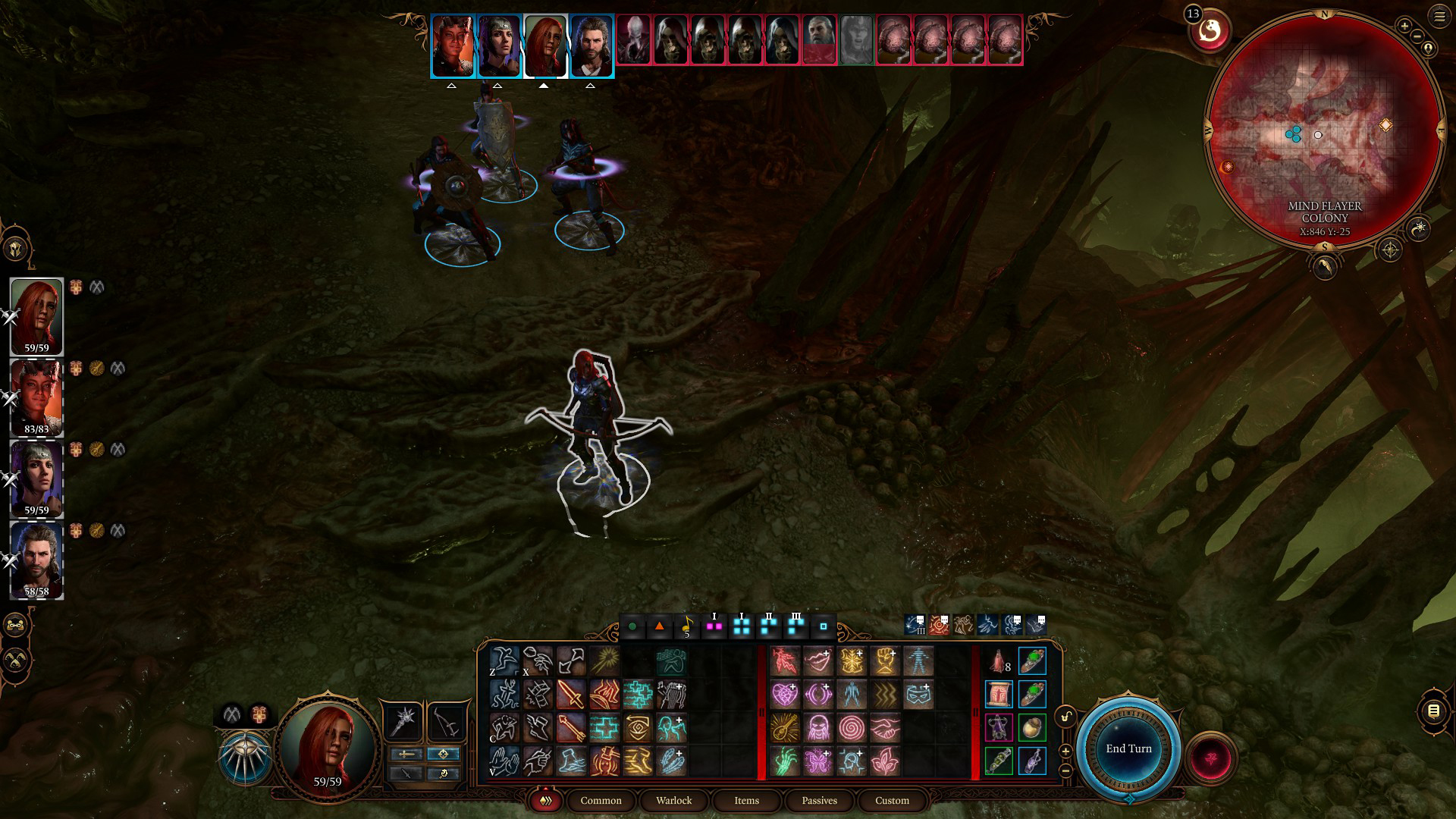I find myself saying it anytime I try to recommend some of my favorite games of all time to friends: "It's turn-based, so you might not like it. But..." The latest instance of having to qualify an incredible game with a warning about the combat came a few weeks ago. I had purchased the Early Access version of Baldur's Gate 3, and I was trying to sell my friend Jack on its merits. And there are a lot of merits there. But before you can sell someone on an experience that will be both slow-paced and long—so long—you have to point out the potential flaws, and for as long as I've played video games, "turn-based combat" has been perceived by many as a flaw.
Video games are, broadly though of course not universally, fast-paced, visceral experiences, in which your skills on the keyboard-and-mouse or controller directly correlate to how well you perform. There's a reason that the most-watched video games on the planet are either shooters—Counter-Strike, Valorant, all of the battle royale games—or League of Legends, which is frenetic in its own way. Turn-based games flip that on its head; instead of checking who has the best fast-twitch reflexes and accuracy with an M4 rifle, these games boil down to strategy, planning, and executing the correct commands at the right time. Often in these games, you win or lose based on how well prepared you are, and how well you grasp what tends to be a complex web of game systems and inventory management.
This is true of Baldur's Gate 3. Based off the current set of Dungeons and Dragons rules (5e, whatever that means), Larian Studios' newest role-playing epic builds off of what the studio accomplished with the excellent Divinity: Original Sin and its somehow-even-better sequel. What this means in practice is that the player spends a lot of time in menus, equipping a party of four characters with the best items and preparing the best spells to use whenever combat does pop up across the lands of Faerûn. In combat, it means that the player has a limited set of actions and movement, and must figure out the puzzle inherent in each encounter's limitations.
Let's look at an example of YouTuber sin tee fighting Commander Zhalk on Tactician Mode, the hardest difficulty.
Commander Zhalk is the first boss in the game, and players aren't really supposed to beat him. The goal is to make it across the room and hit a transponder to get out of a slowly crashing ship, and Zhalk is just a distraction. But he drops an incredible sword and gamers love a challenge, so it's worth trying to kill him. Thanks to the mechanics of turn-based combat, a player trying to take him down before it's feasible can't just cheese or outskill him to death, like people do when they play, say, Elden Ring with no gear for the entire game. No, instead, players in BG3 have to rely on planning, dice rolls, and a lot of luck.
Is that better? Well, define "better." For me, it absolutely is. I used to be a capital-G Gamer back in my youth; I played Halo 2 with professional players, and considered myself above average at FIFA games that required moment-to-moment inputs to win. However, as I've aged in my gaming career, challenges like those in BG3 are more my speed. It might not sound like much fun to a 14-year-old to spend a large chunk of what Steam tells me are the 56.4 hours I've played of this game managing my party's gear, but I find it thrilling to do that right be able to steamroll even the hardest challenges.
I'll give an example. Spoilers aren't important here, but I'll just say that I was facing a god-avatar who hit like a truck and also had a lot of annoying little minions who hit like smaller trucks. This felt like the climax to a story arc in the game that started just about an hour into the adventure, and I was ready to get my ass handed to me. But I had done such a good job of building my party, specifically the barbarian-paladin hybrid Karlach and the light cleric Shadowheart, that I was able to control the battlefield from turn one, slowly whittle down all of the annoying minions while freeing an angelic NPC to help, and then Karlach simply blasted the boss into hell with smites and big polearm smashes.
I had really won the fight before it began. I'd added the paladin class to Karlach's repertoire, giving her the Divine Smite spell that she used to obliterate the boss, and I had changed Shadowheart from a "trickery" cleric into one of the light domain, which allowed her to unleash the power of, uh, light, to do screen-wide damage to the minions. Before they cast, I boosted their attacks with Haste and with my main character's Bardic Inspiration spell—in BG3, if you sing well enough at someone, their attacks land more accurately. All of these were choices I made hours before I even stepped foot into the boss room, and I felt no less accomplished than if I had button-mashed my way to victory.
The challenge of turn-based games, to me, has always been about figuring out the way to have the least amount of turns possible in every fight—to have less combat, ultimately. This was the case in Final Fantasy X, where I scoured the entire game world to find the celestial weapons that would help me one-shot even the toughest bosses, and it was the case in Persona 5, which consisted of hours upon hours of managing the game's persona system—think of a really fucked-up version of Pokemon—to create demonic beings that would wipe out whole battlefields in a single spell.
BG3's combat is also unique even among the turn-based genre, thanks to Larian's insistence on giving the player near-unlimited choice. Beyond the standard options of talking your way out of combat completely—my main character has maxed out charisma, which means she can convince a lot of potential enemies to simply side with her instead—the battlefield and even the enemies themselves become my potential weapons.
I was playing a different save with some friends from my World of Warcraft guild—oh yes, this game has four-player online multiplayer, which is glorious as long as everyone is OK with skipping through dialog a bit—and there was an enemy standing on top of a box. One of my party members thought it would be funny to pick up the box to see what happens. What happened was: The enemy, a gnome archer, fell backward off the ramparts to his death. It's a little thing, but that type of environmental interaction was born organically from having the time and inclination to scout the battlefield before taking a turn, and then executing the sequence of moves to pull off your bright idea. Almost invariably, BG3 lets you make your bright idea a reality.
Baldur's Gate 3 has taken over my life over the last month, as I play deep into the night while waiting for World Cup games to start at ungodly hours. A big part of that is that it's an extremely well-made role-playing game, in which the player is encouraged and maybe even required to think like their character in order to survive. That on its own makes for a great game: we have the proof in Disco Elysium. The combat in BG3, though, is what has hooked me. I've scoured Reddit post after Reddit post trying to figure out how to fine-tune my squad, and I've restarted fights just to see if there's a different way to solve a puzzle or to save nameless NPCs who happened to be fighting alongside me.
If I've played 56.4 hours of BG3, I've spent another 56.4 just thinking about the game's many systems in order to gain an advantage as I head into the titular city of Baldur's Gate and the endgame of this adventure. Would I be enjoying it as much if the combat were fast-paced and skill-based? I don't think so. Elden Ring is an achievement in gaming, but reliance on stick skills has made it so I've never gotten farther than, like, 20 percent in. Similarly, I just played Final Fantasy XVI and found myself mentally and physically exhausted from that game's fast-paced sword combat. Does that make those two games worse than Baldur's Gate 3? Not exactly, but it does make them worse for me.
There's something soothing and obsessive about the pace of a turn-based game, and Baldur's Gate 3 has mastered decades of that genre and put it into one gorgeous-looking package. Watching Gale the wizard-turned-sorcerer teleport to high ground, cast Grease on the floor, then igniting that Grease with a supercharged Fireball that wipes out an entire enemy party is an experience that keeps hitting the dopamine center of my brain even after so many hours. I want to take my time, crack the code of an encounter, and then absolutely annihilate my enemies, one well-considered decision at a time. It might not be for everyone, but Baldur's Gate 3 is good enough that I may never again have to warn anyone about turn-based combat.






